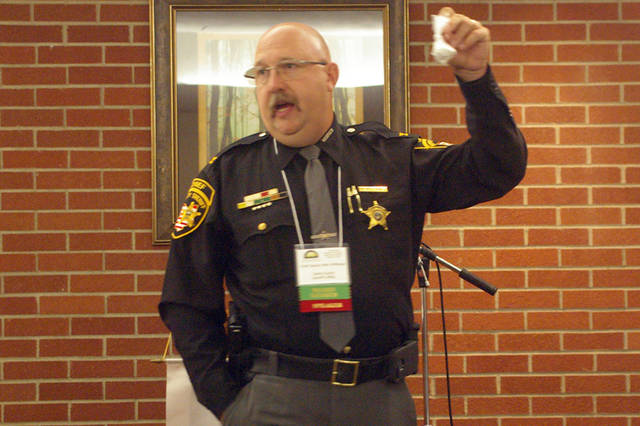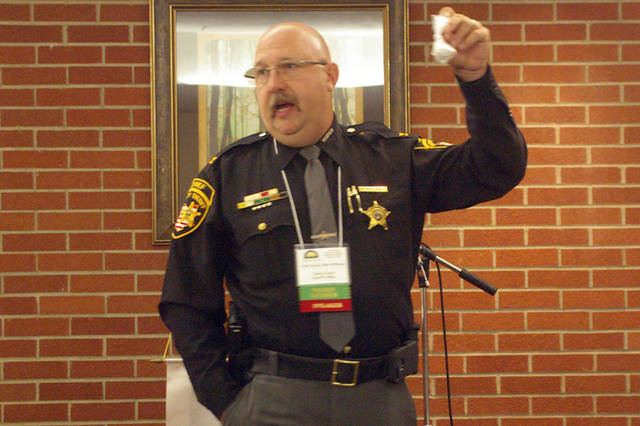

GREENVILLE – Darke County Common Pleas Court Judge Jonathan Hein and Chief Deputy Mark Whittaker of the Darke County Sheriff’s Office encouraged Ohioans to vote no on Issue 1 during a Darke County Chamber of Commerce event Friday morning.
The Darke County Chamber of Commerce opposes Ohio Issue 1, a proposed constitutional amendment also known as the amendment To Reduce Penalties for Crimes of Obtaining, Possessing, and Using Illegal Drugs. The changes to the constitution would be implemented if more than 50 percent of Ohio voters vote for the amendment in the Nov. 6 election.
Speaking at the Chamber’s Good Morning Darke! program at the Brethren Retirement Community’s Brick Room, both Hein and Whittaker said Issue 1 could hinder their ability to address drug trafficking and usage.
“If we vote for this, if this passes, it will change completely the way law enforcement deals with (drugs),” Whittaker said.
The goal of Issue 1 is to reduce the number of people in prison for low-level, nonviolent crimes. Money saved through fewer incarcerations would be put toward drug treatment and supporting crime victims.
Hein questioned the amendment’s effectiveness, saying the threat of jail time can be a motivator for addicts to seek help.
“I would say I’m in favor of that if it works in reality,” Hein said of Issue 1’s desire to get drug users into voluntary rehabilitation. “If they did that, I would already be out of a job. You could lay off half of the sheriff’s deputies.”
Whittaker echoed Hein’s sentiments when he said Issue 1 would take power away from judges. He also said it would hinder law enforcement’s ability to police drug trafficking.
The Darke County Sheriff’s Office, like most small agencies throughout the state, doesn’t have the budget for undercover officers who can catch drug dealers in the act, Whittaker said. Darke County’s small population also makes it difficult to put deputies undercover without someone recognizing them, he said.
Because of the difficulties in catching drug dealers in the act, the Darke County Sheriff’s Office and other law enforcement agencies use possession laws to crack down on the flow of drugs throughout the state.
People caught with drugs can become informants who help build cases against drug dealers, Whittaker said, but Issue 1 would limit judges’ ability to sentence people to prison for drug possession, which would lower the incentive for offenders to cooperate with law enforcement.
Although drug trafficking would still be an enforceable crime if Issue 1 passes, Whittaker said drug dealers simply would carry smaller amounts of drugs to avoid harsher penalties. But even small amounts of drugs such as fentanyl can be deadly.
“This is not personal use,” Whittaker said, holding up a bag representing 19 grams of fentanyl. “This is drug trafficking.”
Under the Issue 1 proposal, possession of less than 20 grams of fentanyl would be a misdemeanor. But 19 grams of fentanyl could kill 9,500 people, which is the equivalent of 75 percent of Greenville, Whittaker said.
“This is a lot of fentanyl, even for a daily user,” Whittaker said.
Hein also questioned the amendment’s implication that Ohio doesn’t spend enough money on rehabilitation. The state spends almost $1 billion annually to fight drug abuse and addiction, $270,000 of which goes to Darke County courts each year, Hein said.
He also said there already are programs in place for inmates to reduce their prison time, which is another goal of Issue 1.
According to a poll of 1,017 people conducted by Baldwin Wallace University from Sept. 28 through Oct. 8, Issue 1 has the support of 47.9 percent of Ohio voters while 30.5 percent oppose it and 21.7 percent are undecided. A poll of 500 people from Suffolk University from Oct. 4 through Oct. 8 found 43.2 percent of Ohioans support Issue 1 while 37.8 percent opposes it and 19.0 percent are undecided.
If Issue 1 passes, Whittaker said Darke County and other law enforcement agencies would reconsider if there would be value in anti-drug units.
Hein predicted Issue 1 would reduce neighborhood safety, drug treatment and rehabilitation of addicts in direct contrast of its stated goals. He compared it to an onion and said Ohio voters would see the problems with the amendment when they peal back the layers.
“Only when you start pealing back the layers of an onion do you understand what’s inside,” Hein said, “and like most onions this will make you cry.”
To read the full ballot language of Issue 1 along with arguments for and against the proposed amendment, visit the Ohio Secretary of State website at https://www.sos.state.oh.us/globalassets/ballotboard/2018/2018issuesreport.pdf.





